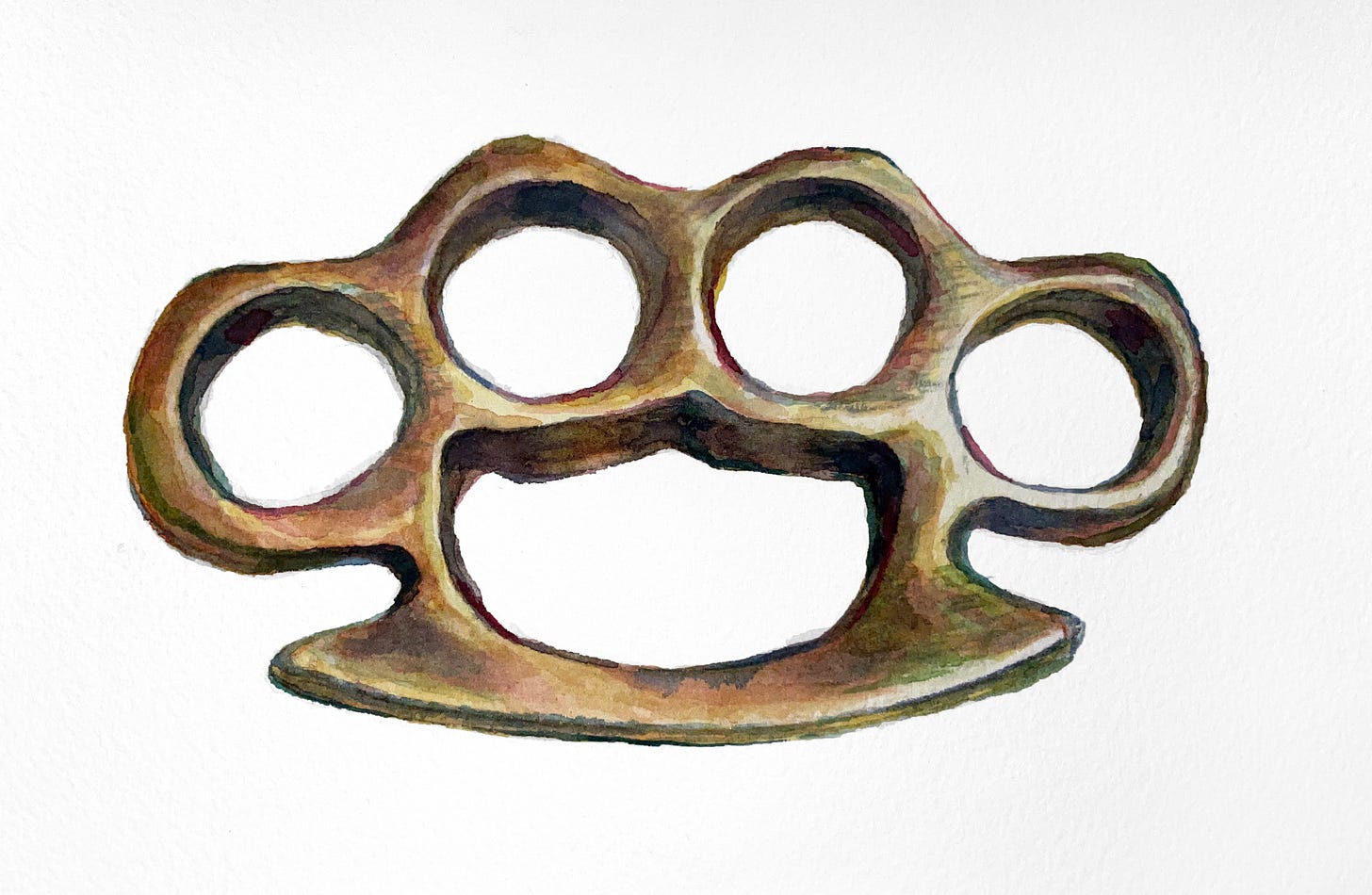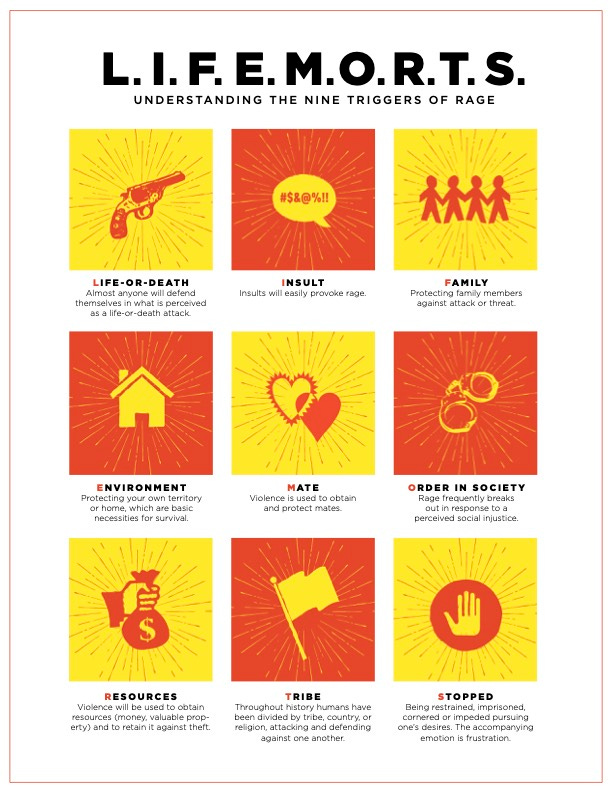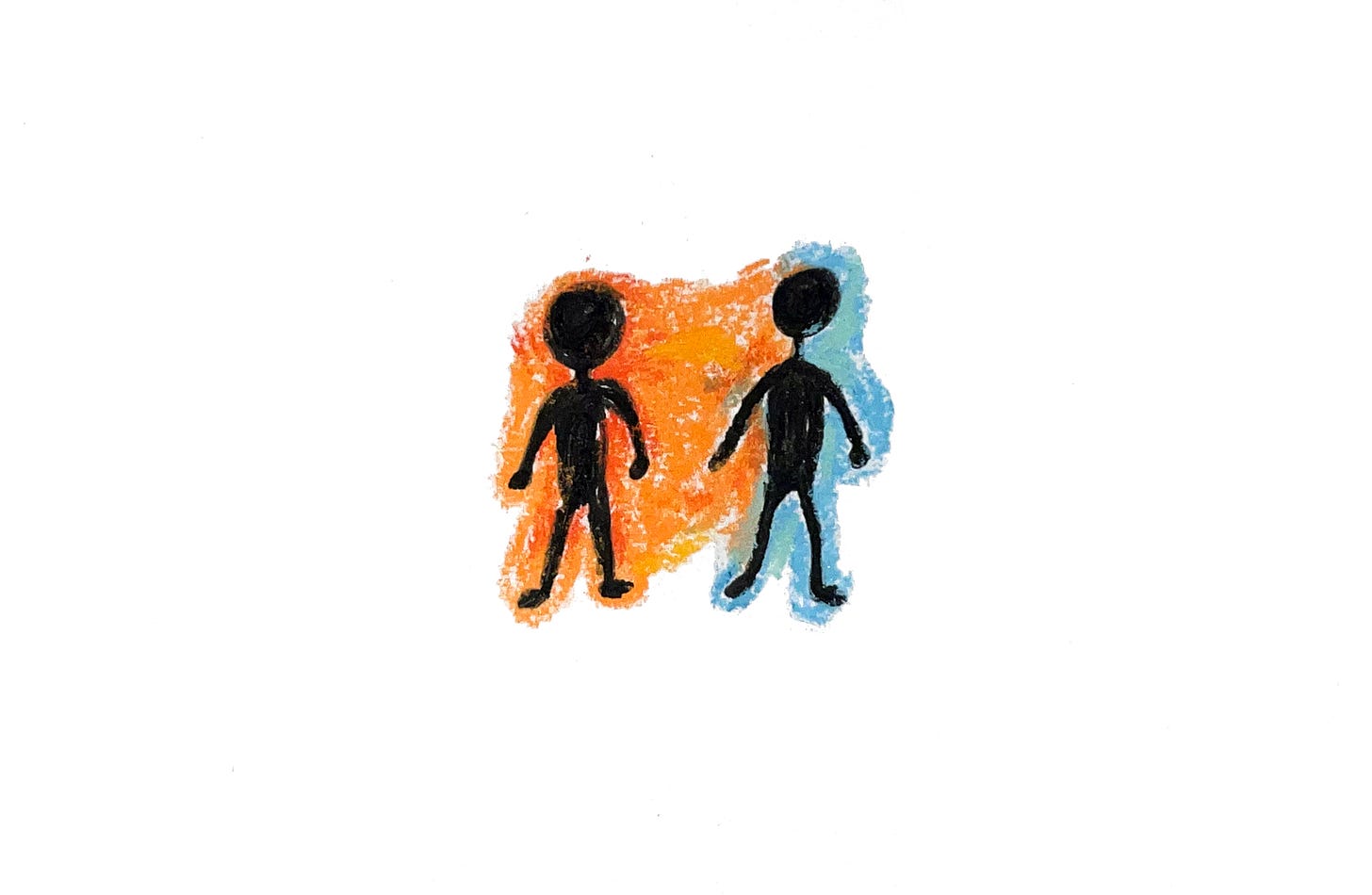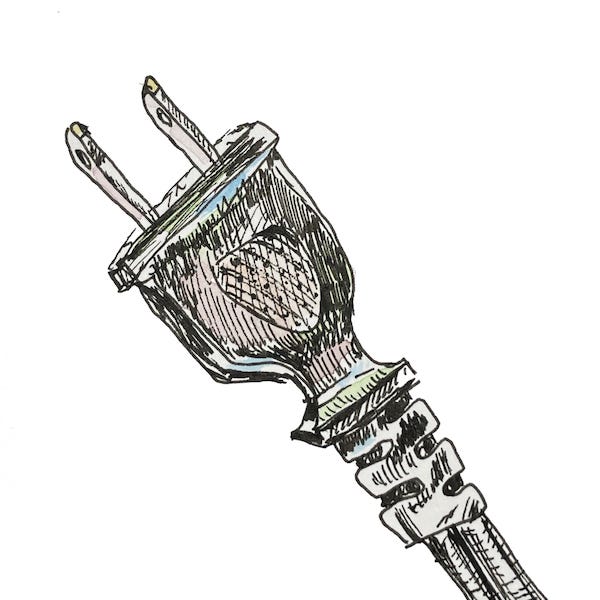We Came For Conflict, so here it is. This is a long post, click here for the full experience and please subscribe! I also audio recorded it on Spotify. Y’know, just some easy listening about conflict while going for a stroll or washing dishes. Hope it resonates! Let’s get into it.
Conflict Is Felt Within
Conflict messes with my flow. Generally I move calmly through the world, my body doing its thing being all calm and strong, breathing and alive. But then conflict strikes. Someone does something upsetting to me, and I might think, Hey, brain, don’t worry. Be cool. It’s not that deep. But when my brain is activated by anything it perceives as threat it’s like OH YES THE FUCK IT IS THAT DEEP then grabs the wheel, floors the gas pedal, and drives me off a cliff.
It’s hard to function when I’m in conflict. I’m less clear, more agitated. Internally, I don’t feel chill. My body becomes hijacked by my brain.
Unfortunately, this happens often. The brain is obsessed with looking for conflict. It’s constantly on guard, scanning for trouble. When activated by threat, the brain responds quickly to prepare the body for fight or flight.
I’m trying to notice what happens when I become activated. (There are other terms for activation, like pinched.1 Pinged. The often-misunderstood and overused word “triggered.” Or if something isn’t exactly triggering as much as it’s simply unpleasant, it might be called a tremor.) We respond to activation in our own personal ways through our nervous systems. When activated, we immediately physically feel something is off. For me, depending on context and who or what causes activation, the felt sensation is a drop from my chest into my belly. My heart will race. Sometimes there’s a tingling around my jawline, or a warm flush from my cheeks to the back of my neck. I feel like time is either suddenly slowing down, or speeding up. It’s from this warped reality I then try to respond.
I recently had the privilege to study with Reverend angel Kyodo williams who taught me a very important lesson: Triggered = Stupid. So core to her teaching, she wrote it in big bold letters so it imprinted through my eyes and onto my mind.
TRIGGERED = STUPID. No truer words have ever been coupled. When activated I do indeed become stupid. Then later I regret how I acted.
I’ve identified some of my TRIGGERED = STUPID behavior patterns. Here we go:
I stop listening and instead say many words quickly and incoherently.
I forget what I’m saying in real time as my thoughts evaporate before I finish my sentence.
If I’m hurt, or angry, I’m mean. “Venomous” my husband has said.
I say nothing at all, sinking quietly into myself and numbly smiling over my rage.
And most embarrassingly, I fawn and overcompensate with kindness.
These patterns thoughtlessly occur when I get activated. The response is a knee-jerk reaction. I behave in ways I’ve learned to do since I was a kid. How or why these have become my go-to moves is something to explore with close friends or in therapy. But becoming aware of these patterns is the first step to trying to change them.
Pattern + Pattern = Explosion
When faced with a problem, humans have been conditioned to be adversarial, and we also kind of like it. Competition is motivating, winning feels good. We feel stronger in our positions when we diminish another’s. There’s something delicious about coming up with the perfect put-down. We want to inflict pain onto those who hurt us or people we love. We seek revenge. We gossip. We fantasize about being morally right while our opponent is publicly proven to be wrong. As a defense attorney who’s attuned to my body, I admit there is no sweeter feeling than hearing a judge say “Over the objection of The People…” and then hear the ruling in my favor. I can practically feel the dopamine spurt of joy flood my bloodstream. But these moments of satisfaction are fleeting. It never lasts. There’s always gonna be another bump in the road.
Our activated patterns tend to fire off when we’re in a conflict with another person, which naturally sets off their patterns too. Our nervous systems co-regulate with each other, which means the nervous system of one person influences the nervous system of another. It’s why we might feel weird vibes off someone. Co-regulation isn’t just interpersonal, it’s biological and neurological. So if both of us aren’t in tune with what’s going on internally we can end up just stupid behavior patterning all over each other. Then we end up in a conflict loop. Ping! Ping! Ping! Ping! Shots fired from both sides turn conflict into battle.
Continuously engaging in conflict loops has its costs. Constant activation keeps us on guard, distrustful of others. It erodes relationships. It calcifies a fight or flight tendency into a personality.2 We can get stuck in this mode, and trap ourselves into viewing our lives through this lens. We lose ourselves. We lose opportunities for redesigning our relationships.
Understandably, in conflict it’s hard to stay present. When mired in conflict, our thoughts race. Past conversations lap in our minds like a skipping dusty record. We ruminate and obsess–the analogous opposite to limerence (which we experience when falling in love, steeped in New Relationship Energy.) It’s distracting and clouds our thinking.
Our health also suffers. The hijacking of the nervous system releases the hormone cortisol which keeps us on high alert. Recurring injections of cortisol can impair the immune system, degrade memory and concentration, weaken muscle tissue and bones, and accelerate the onset of disease. When activated we get tunnel vision and literally cannot hear people. So we forget how to listen. This is “stress” impacting our bodies. When we get into these patterns it legitimately becomes harder to feel okay and think straight. We become ticking time-bombs glitching in fight or flight mode.
Seriously, Why Are We Like This?
Ugh I know. We just are. It has to do with survival.
We all experience pinches and triggers all the time. At work, within our families, some rando at the gas station, a too-close commuter threatening monkeypox on the train. It’s hard not to lose our shit, and sometimes we do.
But we really are all like this. Dr. Douglas Fields is a neurologist who studies the depths of the brain, like the neural circuits operating beneath levels of consciousness. He researched what causes people to react in rage and why it happens so quickly. Studying people from all over the world, Dr. Fields noticed several themes. He devised the mnemonic “LIFEMORTS” to itemize the elements that make us flip our lids. I find this research fascinating because maybe once we understand the many things that can set us off at any given moment, we might try to react a little less emotionally when they do.
L 'life or limb': this is a basic question of self-defense
I insult: whether verbal or physical, it’s when we feel insulted, or when the image we have of ourselves feels threatened
F family: our animal instincts tell us to protect our nearest and dearest
E environment: when someone encroaches on our personal space
M mates: aggressive behavior is used to obtain or protect mates
O order: we begrudge those who threaten to disrupt an established system of rules
R resources: for an animal, these might be food and water; for us, resources are more likely to be money, valuables, and our time
T tribe: we tend to want to defend those with whom we identify, if not biologically (see 'F') then socially
S stopped: when we feel stuck or 'stopped' by a situation or another person, we might lash out (in a traffic jam, for example)
Some Strategies
First, we must check ourselves before we wreck ourselves. We gotta LISTEN to what our bodies are telling us. We should understand our reactions might not be totally accurate. We may be responding to something else in our lives or echoes of the wounds from our childhoods. If we feel ourselves activated in real time we should NOTICE it before we start opening our mouths. Just stop and notice.
As we notice what’s happening with us, we might choose to report what we’re feeling in our body to the person we’re in conflict with.3 Sometimes this information alone can slow things down. But sometimes, when the blood is boiling and there’s no way for communication to be clear, it might be best to pause. Because once emotion takes over the logical brain shuts off. (Triggered = Stupid.) It may be time to step back. Take that time. Sit in silence until the body calms down. Or leave the conversation if necessary. But when we leave we should let the other person know when we’ll come back so it’s not up in the air or end up swept under a rug. The step back helps because it lets the strong emotions pass and morph. So the next time the issue is discussed it can be from a place of clarity, not from emotional hijack.
Conflict is rarely about the issue we think it is. Usually there are other concerns at play. Superstar relationship therapist Esther Perel says conflict is not about content, but about underlying agendas. Like who has more power? Is there care and closeness? And do we feel respected and recognized?
Keeping all this in mind, when we do connect to work through a conflict, it helps to have a roadmap. There’s a practice called Beginning Anew. Introduced by the late Thich Nhat Hanh, it’s a way to check in with one another. In this structured dialogue we can reckon with conflict and make amends if we need to. It’s a chance to deeply appreciate the people in our lives, and save relationships by keeping difficulties from growing to where they explode irreparably. There are four steps.
Expressing appreciation - we start with focusing solely on the positive qualities in the other person or positive things we noticed or learned about them recently
Taking the opportunity to admit any regrets, if there are any - we might apologize for things we said, did, or neglected to do that may have hurt the other person
Share what’s been going on with us - communicate what’s been keeping us preoccupied to alleviate if the other person has feelings of guilt or confusion that our change in behavior might have had something to do with them.
Express hurt in a calm way - share with the other person the times we’ve felt hurt while they listen to us. They later can also respond or do so another time. This step might include a neutral third party too.
Having a format is surprisingly helpful for moving through conflict. Try it over drinks with friends or set aside time with a loved one.
Sometimes conflict really is just so painful though, or too complex. Mediation is an option. As is exploring restorative practices which manage conflict by building relationships and repairing harm. The way Western culture generally deals with conflict is by looking to arbiters to determine the outcome- a judge, a teacher, a parent, a jury. Courts are full of conflicts gone awry, some violently so. A restorative process provides opportunities for interpersonal conflict to be generative, and collaborative. It involves input from the parties involved, and includes those around them (their community) who might also be connected to the conflict to be part of the decision-making too. Restorative practices are rooted in indiginous peacemaking traditions and are led by people who have learned how to skillfully facilitate these group conversations. Restorative Justice is a practice which addresses the harmful impact of crime. It focuses on true accountability and repair, not just the doling out of punishment. It becomes more than just saying sorry, it’s doing sorry. When people are involved in determining the outcomes of their own conflicts, it counters the helplessness and resentment most people feel when their life is in someone else’s hands, like HR, or lawyers. I’m oversimplifying restorative practice for now but I do want to mention it here. I remain hopeful that the use of restorative practices may become more common in our culture. I plan to write more about it in this newsletter.
Ultimately It’s On Us
Sadly, there will be times when the people we are in conflict with are not ready, or are truly unable to handle hard conversations. We can try, but it won’t always work. So if a relationship is hurting us, or the relationship is spiritually depleting while simultaneously growing unwieldy, we are allowed to stop feeding it. We cannot change how people act, but we can change how we respond to them. When they go low, we go high. When they’re mad, we’re practicing calm. We can use our own inertia to reshape patterns between us.
And I hate to say this but sometimes a relationship just needs to end. Too much conflict can be a signal for change. We can still love the person, but perhaps from afar. Relationships come and go. We choose who we surround ourselves with.4 So let’s choose to be with those generating energy which lift us up5, and be cautious around those who continuously bring us down.
But also? We gotta Do The Work. We might actually be the source of conflict in the lives of others. Take a hard look. Are we okay? Are our relationships okay? As I was working on this post, adrienne maree brown had just published this totally aligned piece about holding ourselves accountable. Her writing makes me feel like I’m on the right track here. brown wrote:
“If we can’t be aware of—and responsible for—our own feelings, then anyone else we are relating to can easily become a site of our projections or unharnessed energy. We can have negative and harmful impacts we did not intend.
Trauma and toxic patterns trickle outward, viral. Even small misalignments within can create ripples that change the culture of a whole community. What begins as a wound in one person can move like a sharp knife through a friendship, romance, workplace, family, or community.”
As a dear friend recently described, if we’re not doing the work our pain congeals around us and then sticks to anyone we touch.
Life is hard and suffering truly is all around us. Suffering actually lives within us. Dukkha, the Buddhists call it, is the innate reality that life includes pain and levels of unsatisfactoriness. We each need to be aware of our suffering, as painful as it may be, so we can better know ourselves. Like, it’s good to be sad. It helps us heal. Try therapy, a private way to process hard emotions. Ease off the glowing distractions and intoxicants, feel those feelings through. Practice self-care, rest. Workout. Ask friends and mentors for honest feedback about areas for growth. Listen to them. And listen to other people as they explain what makes them feel rage to have compassion for their perspective as they respond to conflict too. We can grow. We can learn new skills, like how to use non-violent communication with one another, or channel our anger so it doesn’t poison our interactions. We could stop being cynical about meditation and just try it, and learn to practice mindfulness and breathing exercises to calm our nerves. We can do it all! I believe in us.
Transformation is kind of the shiny buzzword right now. But maybe it’s risen for a reason. We’re in a rapidly changing world. Realities are shifting in an instant. We need to be clear to be able to move through all of this together. So we’re going to have to work through our conflicts. Our lives are composed of the quality of our relationships. Take time to assess. Try on a new perspective. Let’s choose to believe people can change. (Because we can.) Let’s recognize conflict is normal, and healthy! It nudges us to see things differently and flex our communication muscles. Let’s see if we can treat our conflicts as opportunities for transformation. Breaking is easy. Rebuilding is harder. Let’s get to work, and let’s work it out.
“Pinched” is a term I learned in an intense and powerful workshop with Learning as Leadership. Boy oh boy did I ever get in touch what sets off my fragile ego in this training.
When groups of people stay in these conflict loops it becomes culture, which inevitably leads to high conflict and devastating destruction.
I give an example on the recording but it might go something like this: “I’d like to continue this conversation but my heart is racing and my mouth is going dry. When I feel this way I tend to lash out, and I don’t want us to fight. Please lower your voice because it’s making my body feel tense.”
If feeling stuck or trapped in a relationship, it’s time to seek support.
This week I was reading a Jewish children's book to my daughters about "mitzvahs" or the doing of good deeds.
"It's a... it's a... it's a mitzvah! It's a mitzvah to cheer on your friends."
Plugging good work by people I love and admire:
Marina Shifrin makes art and nice internet.
Resham Mantri guides grief as a death doula and writes about it.
Eric Waters writes truth-telling poetry and the world today by way of our history.
If in NYC y’must go view art at Ulrik.











Share this post